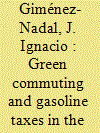| Srl | Item |
| 1 |
ID:
149987


|
|
|
|
|
| Summary/Abstract |
Using monthly data from the Spanish gasoline retail market we explore asymmetries in consumers’ behavioral responses to changes in gasoline prices and taxes. In particular, we are interested in investigating whether an increase in gasoline taxes has a more negative impact on the demand than a –similar in magnitude– increase in the “pre-tax” price of gasoline for different fuel types. We estimate fuel consumers’ responses using a rich set of robust panel data models considering potential dynamic effects and endogeneity problems. We find evidence to confirm the existence of asymmetric responses for the demand of unleaded fuels and agricultural diesel fuel. However we cannot support this statement for the regular diesel case: for this fuel both the tax-exclusive price and the tax elasticities are roughly the same. This result agrees with the fact that “diesel drivers” tend to be better informed about changes in both fuel prices and taxes. Some implications in terms of fiscal policy and pollution and climate change policy are also discussed.
|
|
|
|
|
|
|
|
|
|
|
|
|
|
|
|
| 2 |
ID:
125455


|
|
|
|
|
| Publication |
2013.
|
| Summary/Abstract |
This paper examines how applying different combinations of excise and sales taxes on motor fuels impact the volatility of retail fuel prices and tax revenues. Two features of gasoline and diesel markets make the choice of tax mechanism a unique problem. First, prices are very volatile. Second, demand for motor fuels is extremely inelastic. As a result, fuel expenditures vary substantially over time. Tying state revenues to these expenditures, as is the case with a sales tax, results in a volatile stream of revenue which imposes real costs on agents in an economy. On July 1, 2010, California enacted Assembly Bill x8-6, the "Gas Tax Swap", increasing the excise tax and decreasing the sales tax on gasoline purchases. While the initial motivation behind the revenue neutral swap was to provide the state with greater flexibility within its budget, we highlight that this change has two potentially overlooked benefits; it reduces retail fuel price volatility and tax revenue volatility. Simulating the monthly fuel prices and tax revenues under alternative tax policies, we quantify the potential reductions in revenue volatility. The results reveal that greater benefits can be achieved by going beyond the tax swap and eliminating the gasoline sales tax entirely.
|
|
|
|
|
|
|
|
|
|
|
|
|
|
|
|
| 3 |
ID:
166926


|
|
|
|
|
| Summary/Abstract |
This paper analyzes how gasoline tax rates are related to the time workers in the United States spend commuting by private car, public transport, or with other physical modes of transport. Our identification strategy relies on both inter-state differences and time variations in gasoline taxes. Using the American Time Use Surveys for the years 2003–2015, we find that higher gasoline tax rates are related to less time spent in commuting. Furthermore, higher gasoline taxes are related to less commuting by private car, and more commuting by public transport and/or a physical mode of transport (walking or cycling). Our results highlight the importance of gasoline taxes in the consumption of energy for personal transport, as higher gasoline taxes are related to a greater use of “green” modes of transport, showing that fuel taxes are important for good environmental management.
|
|
|
|
|
|
|
|
|
|
|
|
|
|
|
|